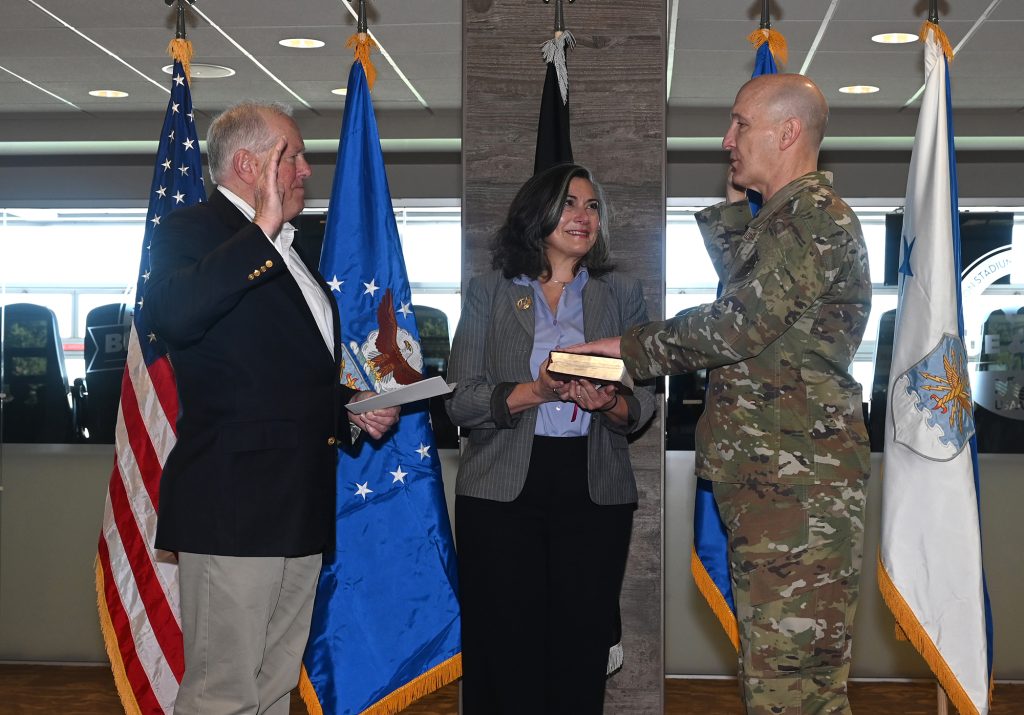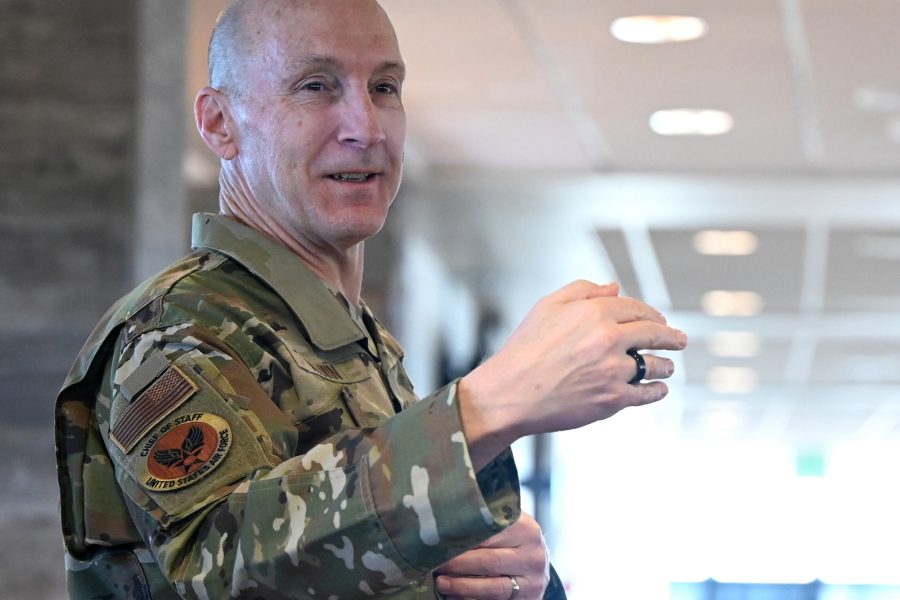The Senate confirmed Gen. David W. Allvin as the Chief of Staff of the U.S. Air Force on Nov. 2, elevating him from the acting role he has held since Oct. 1.
He was soon en route to a brief ceremony to be sworn in as the 23rd Chief of Staff at the same location he took his commissioning oath 37 years ago–Falcon Stadium at the Air Force Academy campus in Colorado Springs, Colo., where he was attending Corona, a conference of senior Air Force leaders.
A career mobility and test pilot, Allvin became Vice Chief of Staff in November 2020, just months after Gen. Charles Q. Brown Jr. became the service’s 22nd Chief. When Brown moved up to become Chairman of the Joint Chiefs of Staff on Oct. 1, Allvin became acting chief while waiting for his nomination to be confirmed by the Senate.
“He has guided many of our most important initiatives to improve the Air Force—including recruiting and operations,” Secretary of the Air Force Frank Kendall said in a statement.
Allvin is only the second Chief to have been neither a fighter nor bomber pilot; the only other was Gen. Norton A. Schwartz, CSAF No. 19, who spent much of his career in the Special Operations world. Allvin has extensive operational and staff background and commanded at the squadron, wing, and operations center levels. He spent much of the past decade in the Pentagon either on the Air Staff or Joint Staff.
“It is truly an honor to be confirmed as the 23rd Chief of Staff of the Air Force,” Allvin said in a statement. “In today’s dynamic environment, our service faces both significant challenges and tremendous opportunities—the world’s greatest Air Force will meet them head-on just as innovative Airmen have done for generations.”
“My wife, Gina, and I are humbled by this opportunity, and we are eager to continue to serve our Air Force, our Airmen, and their families,” he added. “We are grateful for the stellar examples set by General C.Q. Brown Jr., and his wife, Sharene. Gina and I look forward to continuing to serve with them in our new roles.”

As an Air Staff leader, Allvin was a visionary who helped to craft the joint force operating concepts advanced by three successive chiefs: Gen. Mark Welsh, No. 20; Gen. David Goldfein, No. 21; and Brown, No. 22. He helped write “America’s Air Force: A Call to the Future” in 2014 and the “Air Force Future Operating Concept” in 2015, both critical precursors to what would become Goldfein’s vision for multi-domain operations and, ultimately, what is now known throughout the services as Joint All-Domain Command and Control.
More recently, he has been a leading voice tackling the service’s challenges with recruiting and retention, acting as a champion for the Barriers to Service Cross-Functional Team.
Allvin’s accession to CSAF drew praise from Chief of Space Operations Gen. B. Chance Saltzman.
“The dynamic challenges we all face will require strategic thinking like General Allvin’s to overcome, and I consider the Space Force fortunate to have him as a teammate,” Saltzman said in a statement.
Allvin was approved by the Senate in 95-1 vote. The lone dissent came from Sen. Roger Marshall (R.-Kan.).
Allvin’s nomination had been hung up in the chamber for months due to a political standoff that began on March 8, when Sen. Tommy Tuberville (R-Ala.) placed a hold on all general and flag officer nominations and blocking the Senate from approving those nominations en masse, by voice vote. Tuberville placed his hold in protest of a Pentagon policy that provides paid leave and travel funds for troops and family members seeking reproductive services, such as abortions, that are not available where they are based. Tuberville contends the policy violates federal funding law commonly referred to as the Hyde Amendment, which bars the use of federal funds for abortions.
Under Senate rules, Senators may place such holds on individuals or groups. The Senate can force votes on individual nominees, but Senate Democrats, who hold the majority, have declined to do so for months, arguing giving in to Tuberville in this way would burn up too much floor time. The number of general officer nominations affected has grown steadily and now numbers more than 370.
In September, Tuberville tried to force an individual vote on Gen. Eric Smith to be the next Commandant of the Marine Corps in an unusual procedural motion. Senate Majority Leader Sen. Chuck Schumer (D-N.Y.) responded by calling up the nominations for Brown, Smith, and Gen. Randy George, to be the next Chief of Staff of the Army, for individual votes.
A similar process unfolded in recent weeks, as Sen. Dan Sullivan (R-Alaska) said he would try to use the same procedural motion to force votes on Allvin and Adm. Lisa Franchetti, nominated to be the next Chief of Naval Operations.
The moves gained added urgency after Smith, having been confirmed as Commandant but still without a No. 2, suffered a medical emergency and was hospitalized Oct. 30. That left the Marine Corps with a three-star acting leader. Along with Allvin, the Senate confirmed another service head in Franchetti, also in a 95-1 vote, and Lt. Gen. Christopher Mahoney as Assistant Commandant of the Marine Corps, who will temporarily head the USMC in Smith’s absence as the service’s newest four-star general.
“They are outstanding leaders who have faithfully served their country for decades, and I know they will continue to be great leaders of our force as they continue to tackle the crucial national security issues of these challenging times,” Secretary of Defense Lloyd J. Austin III said.
Others also joined in the praise.
“The long wait for Gen. Allvin to be confirmed is thankfully over, and now the Air Force can get on with its important modernization and readiness initiatives,” said Bernie Skoch, Chair of the Air & Space Forces Association. “Gen. Allvin is a gifted senior leader whose operational, staff, and test experience make him ideally suited to build on the outstanding work of his predecessor. The unprecedented global threats facing our military today pose challenges for which airpower is, in many cases, the only answer and most effective deterrent. His leadership will be crucial in the years ahead.”
With Allvin’s confirmation, however, the Air Force now has no Vice Chief of Staff. Deputy chief of staff for operations Lt. Gen. James C. “Jim” Slife has been nominated to succeed Allvin as Vice Chief, but his nomination is among those on hold. An Air Force spokesperson confirmed to Air & Space Forces Magazine that there will be no acting VCSAF; Allvin, like Smith, will functionally as both Chief and Vice Chief until Slife can be confirmed.
A resolution may be coming for those nominees, some of whom have been stuck in limbo for more than six months. Sens. Jack Reed (D-R.I.) and Kyrsten Sinema (I-Ariz.) have worked on a “standing order resolution”—short of a rule change, it would allow the Senate to vote on military nominations in blocs until the end of 2024, with exceptions for members of the Joint Chiefs of Staff or leaders of combatant commands. Schumer said Nov. 1 that he would bring the resolution, which has been sent to the Rules Committee, up for a vote in the near future. It would require 60 votes for passage.
“While today’s vote is a step forward, we continue to urge the Senate to take swift action on the remaining nominations so that these American heroes can lead our team in keeping our country safe,” Austin said.
